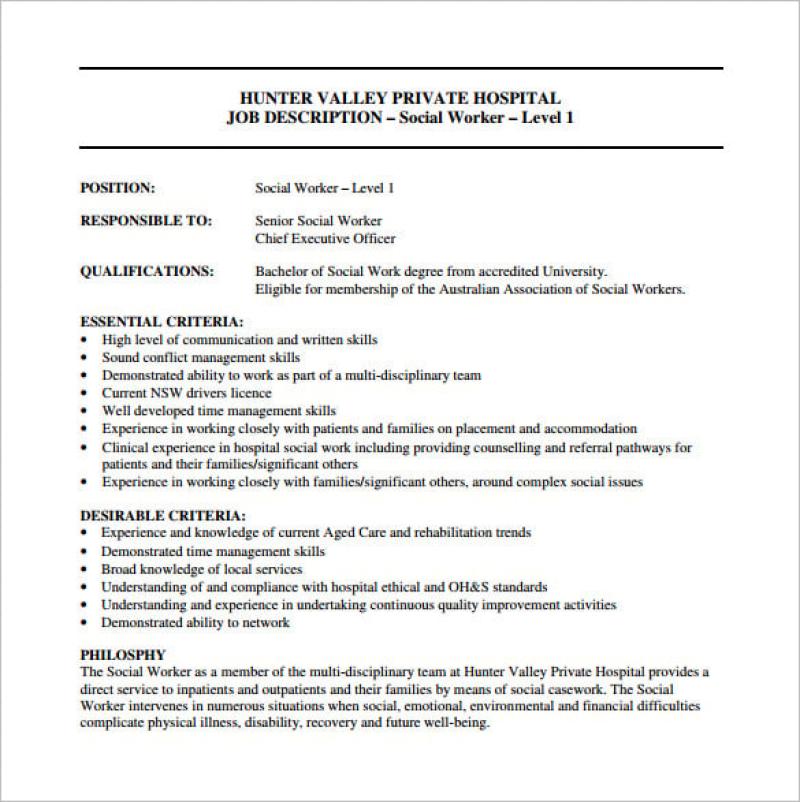What are the main duties of a social worker?
Social workers perform a variety of roles to help individuals, families, and communities address challenges and improve their well-being. The core duties of a social worker can vary based on their specialization and the setting in which they work. Here are some common core duties associated with social work:
Assessment:
- Conduct comprehensive assessments of clients' needs, strengths, and challenges.
- Gather information about clients' social, economic, health, and psychological conditions.
Counseling and Support:
- Provide counseling and emotional support to individuals, families, and groups.
- Help clients cope with and navigate personal and social challenges.
Advocacy:
- Advocate for the rights and interests of clients within various systems (legal, educational, healthcare, etc.).
- Promote social justice and work towards eliminating discrimination and inequality.
Case Management:
- Develop and implement case plans to address clients' needs and achieve specific goals.
- Coordinate services and resources to support clients in meeting their objectives.
Crisis Intervention:
- Respond to crises and emergencies, providing immediate support and intervention.
- Collaborate with other professionals and agencies in crisis situations.
Community Development:
- Work to enhance the well-being of communities through the development of social programs and services.
- Facilitate community engagement and empowerment initiatives.
Education and Prevention:
- Educate individuals and communities on social issues, resources, and available services.
- Develop and implement prevention programs to address social problems.
Research and Evaluation:
- Conduct research to better understand social issues and contribute to evidence-based practices.
- Evaluate the effectiveness of social programs and interventions.
Policy Development:
- Participate in the development and analysis of social policies.
- Advocate for policies that promote social justice and address systemic issues.
Documentation and Record-Keeping:
- Maintain accurate and confidential records of client interactions and interventions.
- Complete necessary paperwork, reports, and documentation.
Supervision and Training:
- Provide supervision and guidance to less experienced social workers or social work students.
- Stay updated on new developments in the field and participate in ongoing training.
Ethical Practice:
- Adhere to ethical standards and principles in all aspects of social work practice.
- Navigate complex ethical dilemmas and maintain professional boundaries.
These duties highlight the diverse and critical nature of social work. Social workers often work in collaboration with other professionals, agencies, and community members to create positive change and support individuals and communities in need. The specific duties can vary based on the social worker's specialization, such as clinical social work, school social work, medical social work, or child welfare.
Social workers play a crucial role in society by addressing the needs of individuals, families, and communities. They work in a variety of settings, including hospitals, schools, mental health clinics, and government agencies. Their primary duties and responsibilities revolve around promoting social well-being, advocating for vulnerable populations, and providing support services to those in need.
Primary Duties and Responsibilities of Social Workers
Assessment and Evaluation: Social workers assess the needs of their clients, gathering information about their personal circumstances, social environments, and challenges they face. They analyze this information to develop individualized plans to address clients' needs.
Counseling and Therapy: Social workers provide counseling and therapy to individuals, families, and groups. They help their clients develop coping mechanisms, address mental health issues, and improve their overall well-being.
Case Management: Social workers manage cases for their clients, coordinating care, making referrals to other services, and advocating for their clients' needs. They ensure that clients receive comprehensive support and resources.
Advocacy: Social workers advocate for the rights and interests of their clients. They may work to change policies, raise awareness about social issues, and challenge injustices that impact vulnerable populations.
Community Development: Social workers work to improve the well-being of communities by developing and implementing programs and services that address community needs. They engage with local residents, identify areas of concern, and collaborate with organizations to create positive change.
Tasks and Functions Typically Part of a Social Worker's Job Description
Conducting interviews and assessments to gather information about clients' needs and situations.
Developing individualized plans and interventions to address clients' specific challenges.
Providing counseling and therapy to individuals, families, and groups.
Coordinating care with other professionals, such as doctors, therapists, and case managers.
Making referrals to appropriate resources and services.
Advocating for clients' rights and interests.
Educating clients and the public about social issues.
Developing and implementing community-based programs and services.
Monitoring and evaluating the effectiveness of interventions.
Maintaining confidentiality and adhering to ethical standards.
Key Responsibilities that Social Workers Fulfill
Addressing social issues and promoting social well-being: Social workers tackle a wide range of social issues, including poverty, homelessness, mental health, addiction, and domestic violence. They work to improve the quality of life for individuals and communities by addressing these challenges and promoting social justice.
Empowering vulnerable populations: Social workers empower vulnerable populations, such as the elderly, children, people with disabilities, and those marginalized by society. They provide support, advocacy, and resources to help these individuals achieve their full potential.
Promoting social change and advocacy: Social workers act as advocates for social change. They work to raise awareness about social issues, challenge unjust policies, and promote equal opportunities for all. They are a voice for those who are often unheard and work to create a more equitable society.
In summary, social workers play a multifaceted role in society, addressing the needs of individuals, families, and communities. They are compassionate professionals dedicated to promoting social well-being, empowering vulnerable populations, and advocating for social change. Their work has a profound impact on the lives of others, contributing to a more just and equitable society.












